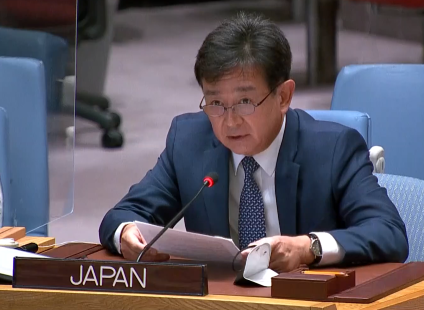アフリカにおける平和と安全保障-持続可能な平和に向けた能力開発-に関する安保理公開討論における大菅大使ステートメント(一部仏語/一部英語仮訳)
令和4年8月8日

I would like to express my appreciation for organizing this open debate on an important theme: capacity-building for sustaining peace in Africa, which is so dear to us. By “us”, I mean the participants of TICAD, the Tokyo International Conference on African Development, and in particular its co-organizers, including the African Union Commission, UN, UNDP, and the World Bank.
Due to COVID-19 and the Russian invasion of Ukraine, Africa is now facing undue complexities that have exacerbated tensions and security challenges. The lack of sustained peace and stability will seriously hinder Africa’s development. The need to address the root causes of conflict, terrorism and violent extremism is greater than ever, in order to bring Africa back on track of sustainable development.
Since its inception in 1993, TICAD has emphasized the importance of Africa’s capacity-building. And since TICAD III in 2003, it has added to its agenda “consolidation of peace” and discussed the root causes of conflicts with a view to prevent their recurrence and achieve sustainable development. Since TICAD 7 in 2019, Japan has been supporting Africa-led institution building, capacity-building and establishment of resilient governance under the banner of NAPSA, “New Approach for Peace and Stability in Africa.”
With these track records in mind, I would like to explain four key elements that need to be respected in promoting capacity-building for sustaining peace.
First, respecting Africa’s ownership. We should support African-led efforts for conflict prevention and peacebuilding. This will include, inter alia, efforts for consolidating democracy and restoring constitutional order, promoting sustainable development through inclusive growth and addressing inequality, and realizing a resilient society to ensure human security and dignity. We look forward to discussing these issues at the upcoming TICAD 8, to be held later this month in Tunisia.
Second, institution-building must be our priority to bring stability in conflict-affected countries. Japan is proud to have provided assistance to African countries to strengthen their institutional capacity in the judicial, administrative and legislative sectors to ensure the rule of law. Strong institutions are essential for delivering socio-economic services to people and for building their trust in the government. We are happy to see our support to strengthen health and medical systems in Africa has proven instrumental in their effective response to the COVID-19 pandemic.
Third, investing in “people”. Capacity-building is needed at the level of individuals who will engage in the activities for peacebuilding, nation building and sustainable development. At TICAD V in 2013, then Prime Minister Abe launched African Business Education Initiative for Youth. It empowers African youth who will contribute to the industrial development in Africa by providing scholarships and internships. By 2021, approximately 1,500 young Africans have participated in this program.
Fourth, effective partnerships. “Ownership and international partnership” have always been the credo of TICAD since its first meeting almost 30 years ago. True partnership to support national efforts to bring peace, stability and sustainable development in Africa should not be driven by commercial, financial or other interests of another country. Transparency is the key. Development finance must adhere to international rules and standards. To promote effective partnerships, we should make full use of the Peacebuilding Commission. It has a unique bridging role as a platform where all relevant actors can come together to consider specific challenges to sustaining peace.
To conclude, Japan looks forward to TICAD 8 to have fruitful discussions on how to advance African development.
Thank you.
